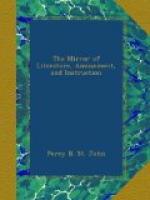We must observe nevertheless, before we conclude, that however ill and tragical the example of the bees may look for human imitation, we are not to suppose that the fact is anything like so melancholy to themselves. Perhaps it is no evil at all, or only so for the moment. The drones, it is true, seem to have no fancy for being massacred; but we have no reason to suppose, that they, or any of the rest concerned in this extraordinary instinct, are aware of the matter beforehand; and the same is to be said of the combats between the Queen-bees; they appear to be the result of an irresistible impulse, brought about, by the sudden pressure of a necessity. Bees appear to be very happy, during far the greater portion of their existence. A modern writer, of whom it is to be lamented that a certain want of refinement stopped short his perceptions, and degraded his philosophy from the finally expedient into what was fugitively so, has a passage on this point, as agreeable as what he is speaking of. “A bee among the flowers in spring,” says Dr. Paley, “is one of the cheerfullest objects that can be looked upon. Its life appears to be all enjoyment, so busy and so pleased.”—Abridged from the New Monthly Magazine.
* * * * *
THE GATHERER.
* * * * *
Toast of a Scotch Peer.—Lord K—, dining at Provost S—’s, and being the only peer present, one of the company gave a toast, “The Duke of Buccleugh.” So the peerage went round till it came to Lord K—, who said he would give them a peer, which, although not toasted, was of more use than the whole. His lordship gave “The Pier of Leith.”—Chambers’s Edin. Jour.
Caroline, Queen of George II. amused herself by reading Butler’s Analogy of Religion to Human Nature; a book which Hoadley, Bishop of Winchester, said always gave him the head-ache, if he only looked into it.
After George II. had ceased to visit the theatres, Macklin’s farce of Love A-la-mode having been acted with much applause, he sent for the manuscript, and had it read over to him by a sedate old Hanoverian gentleman, who being but little acquainted with English, spent eleven weeks in puzzling out the author’s meaning!
Ships.—During the early part of the last century, as has been remarked, almost all the towns of England were on the water (in the navy.) Of the few persons who have been so highly esteemed as to have their names given to men of war, are Dr. Franklin and Joan of Arc, who were thus honoured by the French. In the English navy, the ships the Royal George have been singularly unfortunate. The Great Harry also was burnt in the reign of Queen Mary.
Personal Ornament.—The city of Kano, the great emporium of the kingdom of Houssa, in Africa, is celebrated for the art of dyeing cotton cloth, which is afterwards beaten with wooden mallets until it acquires a japan gloss. The women dye their hair with indigo, and also their hands, feet, legs, and eyebrows. Their legs and arms thus painted, look as if covered with dark blue gloves and boots. Both men and women colour their teeth a blood-red, which is esteemed a great ornament. T. GILL.




